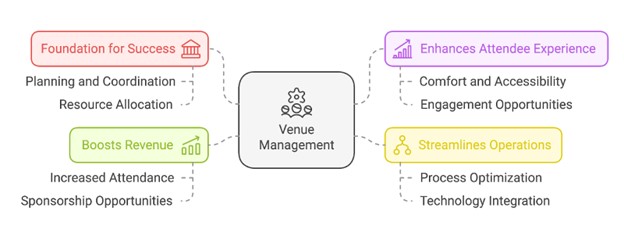A Comprehensive Guide to Venue Management for Event Professionals

When hosting successful events, the venue often plays a starring role. Whether it’s a corporate conference, a wedding, or a live concert, the right venue can elevate the experience for attendees and organizers alike. But finding and managing the perfect venue isn’t just about aesthetics or capacity—it’s about creating an environment where everything runs smoothly. This is where venue management comes into play.
For event professionals, mastering venue management is essential. It’s the backbone of any well-executed event, ensuring everything from logistics to ambiance aligns perfectly. If you’re an event planner or an aspiring professional in the field, understanding the ins and outs of venue management can set you apart from the competition.
We'll go further into venue management in this tutorial, covering its essential elements, why it's so important, and strategies for overcoming its obstacles.
What is Venue Management?
Fundamentally, venue management is supervising and organizing every facet of a location to guarantee that it is ready for events. This includes operational tasks like scheduling, maintenance, staffing, and event setup, and strategic tasks such as client relations and revenue management.
Venue managers act as the bridge between the venue’s resources and the event organizer’s vision. They ensure that the space is not only functional but also planned to give each participant the best possible experience.
The Importance of Venue Management
For event professionals, venue management is not a “nice-to-have”—it’s a necessity. Here’s why:

- Sets the Foundation for Success
A well-managed venue ensures all the logistical elements—like lighting, sound systems, seating, and catering—are seamlessly aligned. When these basics are handled efficiently, the focus can shift to creating memorable moments for attendees.
- Enhances Attendee Experience
The venue significantly impacts how guests perceive an event. Proper management ensures the venue feels welcoming, safe, and conducive to the event’s goals, whether it’s networking, entertainment, or education.
- Streamlines Operations
With good venue management, processes like vendor coordination, equipment setup, and security are handled without hiccups. This reduces stress for event organizers and keeps the event running smoothly.
- Boosts Revenue
For venue owners, effective management maximizes profitability by attracting more clients, offering tailored packages, and ensuring repeat business through excellent service.
Key Components of Venue Management
To truly master venue management, it’s important to understand its core components:
- Space Optimization:
This involves ensuring the venue layout meets the specific needs of each event. For example, a corporate seminar might require theater-style seating, while a gala dinner demands round tables and a stage.
- Vendor Coordination:
From caterers to audiovisual technicians, managing relationships with vendors is a key part of venue management. It’s crucial to ensure they deliver quality services on time and within budget.
- Technology Management:
Modern venues rely on technology for sound, lighting, temperature control, and even Wi-Fi. Managing these systems effectively ensures the event runs without technical glitches.
- Health and Safety Compliance:
Adhering to safety regulations is non-negotiable. This covers crowd control, fire safety procedures, and making sure the location is used by everyone, including people with disabilities.
- Scheduling and Availability:
Managing bookings efficiently ensures there are no scheduling conflicts. Using software to track availability and confirm reservations is a common practice for professional venue managers.
- Customer Relations:
Understanding the client’s vision and maintaining open communication is key. Venue managers often act as liaisons, ensuring the client’s needs are met while protecting the integrity of the venue.
Tips for Successful Venue Management
Effective venue management calls for a trifecta of preparation, communication, and flexibility. Here are some practical tips:
- Invest in Management Software:
Using venue management software can streamline tasks like scheduling, invoicing, and reporting. It’s a time-saver and minimizes human error.
- Build Strong Vendor Relationships:
Create a network of reliable vendors. Having trusted partners ensures you’re never scrambling for last-minute solutions.
- Conduct Regular Maintenance:
A venue’s reputation depends on its condition. Regular checks for wear and tear, electrical issues, and cleanliness keep the venue in top shape.
- Prioritize Flexibility:
Not all events go as planned. Be prepared to adapt layouts, timings, or even services based on the client’s needs or unforeseen circumstances.
- Focus on Communication:
Keep lines of communication open with clients, vendors, and your internal team. Miscommunication can lead to missed deadlines and unhappy clients.
- Stay Updated on Trends:
The event industry is constantly evolving. Stay informed about the latest trends in decor, technology, and guest experiences to keep your venue competitive.
Challenges in Venue Management
Even the best venue managers face hurdles. Here are some common challenges and how to tackle them:
- Last-Minute Cancellations:
Cancellations can disrupt schedules and revenue projections. Having clear cancellation policies and deposit requirements helps mitigate financial losses.
- Overlapping Bookings:
Double-booking can be a nightmare. Using a robust booking system prevents scheduling conflicts and ensures transparency.
- Technical Failures:
Unexpected issues like power outages or AV malfunctions can ruin an event. Always have a backup plan, including generators and on-site technicians.
- Managing Large Crowds:
Handling a large number of attendees can strain resources. Proper crowd control measures, adequate staffing, and clear signage are essential.
- Budget Constraints:
Clients often have big dreams but limited budgets. Finding creative solutions to deliver quality within constraints is a valuable skill.
Conclusion
The art and science of venue management coexist. Making events memorable demands striking a balance between creativity, planning, and problem-solving. For event professionals, mastering venue management means not only meeting client expectations but exceeding them.
Whether you’re just starting in the field or looking to refine your skills, focus on the key components, stay adaptable, and always prioritize the guest experience. With dedication and the right strategies, you can turn any venue into the cornerstone of unforgettable events.
By embracing these principles and staying ahead of challenges, you’ll not only succeed as a venue manager but also build a reputation that keeps clients coming back.

 9054792645
9054792645 info@tktby.com
info@tktby.com
